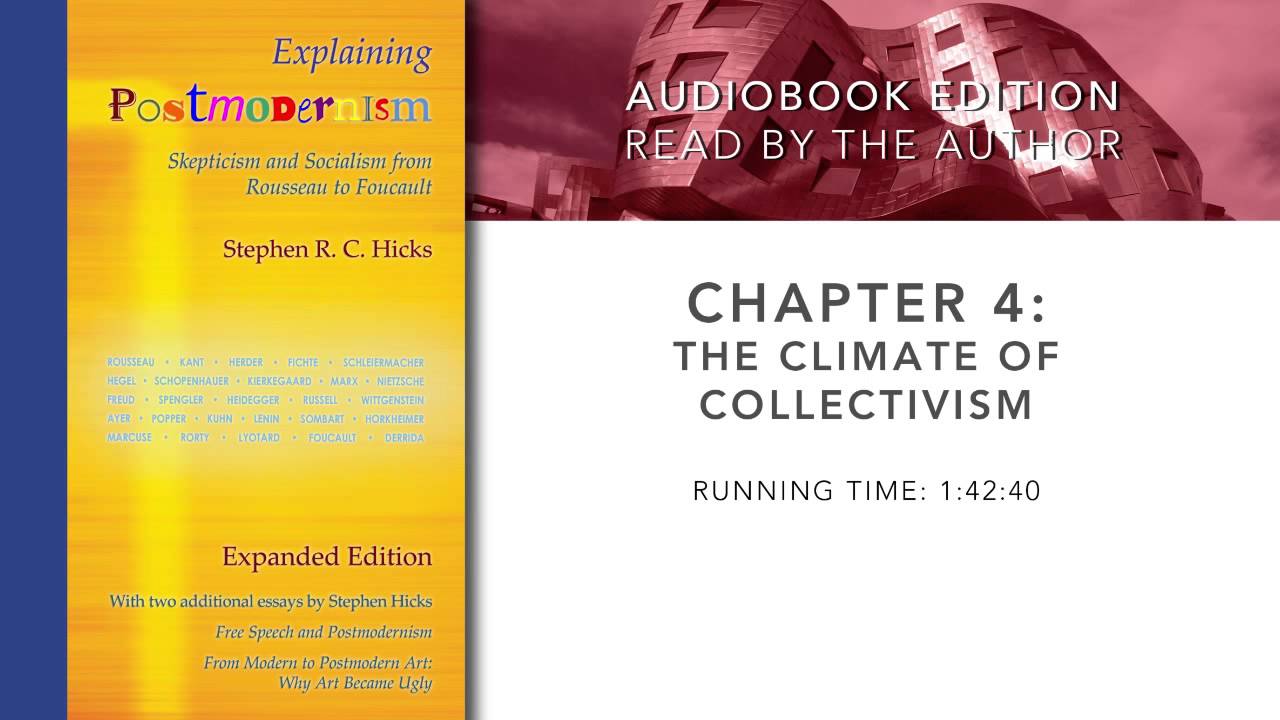CEE Video Channel
This audiobook edition of Explaining Postmodernism is read by the author.
To listen to more of the audiobook on YouTube, visit: http://www.youtube.com/user/EPAudiobook
To download MP3s of the audiobook or for more information, visit Dr. Stephen Hicks’s Explaining Postmodernism page:
http://www.stephenhicks.org/publications/explaining-postmodernism/
Other links:
Facebook: https://www.facebook.com/SRCHicks
Twitter: https://twitter.com/SRCHicks
Website: http://www.stephenhicks.org/
Instagram: https://www.instagram.com/stephenhicksphilosophy/
Source




Hegel : "merely" morally inept and psychologically invalid . Were he alive today, would no doubt be lauded as the leading sociologist and social engineer .
He and John Wesley would make a diabolic team .
Team Totalitarianism ,that is.
Hicks is a moron.
This is the stupidest audiobook ever set to tape. It is complete hogwash.
Human beings were mostly solitary. Riiight.
The writer is but a worshipper of capitalism and science … Much to his own moronic assumption that North Korea is socialist and not Norway or Spain … The book gets really untrue full ofw hoodwink claims in the middle … As he begins to worship capitalism and lifestyle
To be compared with tantrums of children. Not being able to adopt to structures nor accepting needs of others or hierarchies they rage.
The same we see in the left. Denying reason. Sometimes covered in nice words or rage. Compare it to the behavior of children. No responsibility at the end.
I found the first three chapters a VERY nice and compact summary of the roots of post modernism. Then we arrive at chapter 4. The political part. Much less interesting.
1 Metaphysics 2 Epistemology 3 Human Nature/Ethics 4 Politics 5 Art/Aesthetics
I don't think it's helpful to use the term "far-left" unless you first define it. As it is, the term is so vague and ambiguous as to be completely useless. As far as the debate over capitalism v. socialism, you are conflating "socialism" with Stalinist state dictatorship which is extremely misleading and unfair to the vast majority of those who consider themselves to be socialists. Your discussion of the philosophical background of postmodernism is quite good but when you venture into politics you fall prey to false dichotomies and vague language.
I'm still trying to figure out your standpoint because many of these "enlightened philosophy" leaders have contradictory quotes. This chapter is very accurate to what America believes in it's as if they literally had an instruction manual on how to corrupt and counterattack free will yet disguised as freedom or independence aka oppression
@Stephen Hicks
At some point I think you are going to have to explore the Trump era and how many of the new ideas coming from Alt-Right intellectuals are embracing all the logic and rationale of postmodernism. A lot of people on the right I've heard who are fans of this book, unfortunately see it only as a manual for understanding leftism, they don't understand that the primary aspect of postmodernism isn't it's politics, but it's skepticism of reality and reason.
This is such an eye opening book. At last I am beginning to understand the corrupting influence of the anti-Enlightenment philosophers on the Western world view. They are the last gasp of the dying irrationalism of religiosity in the Western world. Hopefully it will finally die off in the near future.
The idea that there are people who think living in primitive tribes is better than modern civilization is outstanding to me. I almost can't comprehend it. These people wouldn't live for very long in such a society. They clearly have an extremely arrogant and misguided understanding of their own position in humanity. In a civilized society, the strong accept the sovereignty of the weak and cooperates with them for whatever use they have, assuming they have a use. In a primitive society, they would just be killed or enslaved. They are not strong, they are weak. They seem to be rather intelligent, and intelligence has never been as rewarded as it is in modern Western civilization. The people they hate are the people who make the world a better place for the whole, while the whole find whatever menial job they can in order to justify the luxury of not having to live in a mud hut. In the past, the strong would survive while the weak would die. Today, the strong carry civilization on their back while the weak complain about how bumpy the ride is. What these philosophers are seemingly, truly fighting against, deep in their very hearts, is the fact that they exist at all; the fact that they are weak while others are strong; the fact that they were born into a game they are incapable of winning, so they do not want to play, and they do not want you to play either.
You can see this sometimes when arguing with black nationalists/identitarians. They often come very close, and sometimes say so with a straight face, that they believe their people are not suitable for modern Western civilization and they regret having been born in an environment where they feel as if they can never truly succeed, not due to systematic racism, but a cold-hearted genetic reality that's easily ignored by white and Asian people. In this way, their own arguments are indistinguishable from white nationalists/supremacists, and anyone who accepts a racially genetic disparity finds themselves worried with the fact that identity politics may actually be justified. For people who smugly refute the idea that white people are privileged due to a history of theft and exploitation, suddenly find themselves wondering if they aren't actually instead privileged due to biology.
The problem with the left is they will never make that argument, so the right never has to worry about answering it.
Really nice chapter I'm a left-liberal welfare capitalist myself and I'm amazed by how very little ideological bias is in this book it's pretty much just reason and facts. I think if you want to make it a little more "fair" but still correct you should
1) Include Keynes with those who debunked Marxism to make it clear your book is focused on explaining postmodernism not laissez-faires capitalism.
2) When you say the social democrats, Marxists, and National Socialists had similar "themes" I know what you meant (they were all appealing to "socialism") but nonetheless make it clear that Marxism and National Socialism were far more similar to each other than social democrats were to either. I think a big reason former social democratic voters went for extreme parties is that they were growing increasingly weary of "reformism" and so on moved to extremes and less so due to heavy overlapse in theory.
As a german: My country makes so much more sense now. Even today Germany is heavily collectivist in nature and the political parties divide themselves basically to left socialists, centrists (who do not deviate much from the social democrats), liberals and the right socialists are up and comming.
It seems that thouse who espouse postmodernism, wish to go back to "the good old days". ala Rousseau. I have my doubts with this kind of thinking. Who really knows what the good old days were? or if waht they think could really have existed? What were the good old days, Middle Ages or Caveman times? In my opinion, Postmodernism is one of the largest heists ever to be propogated by man. It has sought to throw out the baby with the bath water, the way many hold up one memeplex above another seeking to glorify the totality of its monolithic idea.
Absolutely spot on with some of the things you've said (I still have to listen to the second half but I was so enthralled by the first I had to let you know! lol). There's very little doubt that post-modernism has allowed certain ideologies to persist, when they otherwise should've been left to sands of time like the Dinosaurs. It's actually interesting to note here, while I don't prescribe to it myself, I've heard theories about how "ideas" are objects within themselves and like other organisms they work to keep themselves from going extinct. It would seem to me that post-modernism fits the bill quite well here. It's the perfect vessel by which people can hold onto their otherwise dated world views and live with the same convictions as the old philosophers that created such preposterous ideas. It's almost like post-modernism is the left's answer to 'God'. That is to say, it allows these people to remain so fully convinced in their beliefs and live with the same unexamined self-righteousness as theists do, but without the necessary backing of some god or creator. It gives these people their moral objectivity, but unknowingly to them, confines and expresses itself from a subjective and narrow perception.
If I haven't already given it away lol I'm incredibly intrigued by this idea of leftists, progressives and post-modernists that so clearly adhere to the same abstract framework as the church that shunned them as children. They lash out with the same blind rage, they refuse to entertain any voice of dissent, and they use similar, though sometimes scarier, tactics of enforcing group conformity. These people are recreating the same world that they seek so hard to destroy and any/every attempt to warn them of their possible demise is only met with harsh, authoritarian-style demand for compliance, which in turn only makes their end even more inevitable…grab some popcorn people (:
But yea, really really really really enjoy what this chapter so far; absolutely spot on!!! Thank you very much Mr. Hicks for sharing your ideas with me and I look forward to any future publishings!
That's because it's Randian! Watch out. How Is Ayn Rand still a thing.
I found the previous three chapters a very informatively clear and disinvested description of the beliefs of various thinkers, but I agree that from here on, this piece takes a much more ideological bent; one that makes many claim about people and their beliefs that, contrary to the previous chapters, I think many of the subjects would strongly deny is a valid summary or characterisation of their positions. It's a shame! (Then again, I'm sure many of the subjects might feel that such a departing from so-called "neutrality" is always inevitable anyway.)
wait…this is an extremely capitalist-centered and also american-centrist take on postmodernism… Some statements about pro-capital anti-socialist statements are blatantly political rather than philosophical and objective.